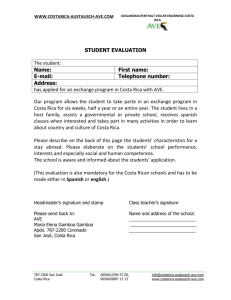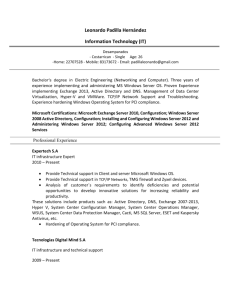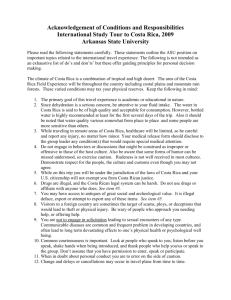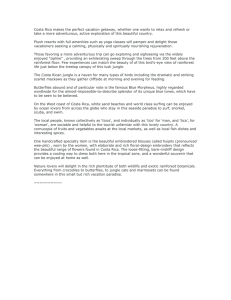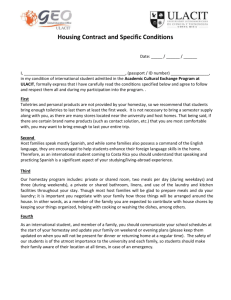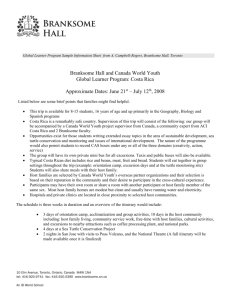Costa Rica Brenna Go..
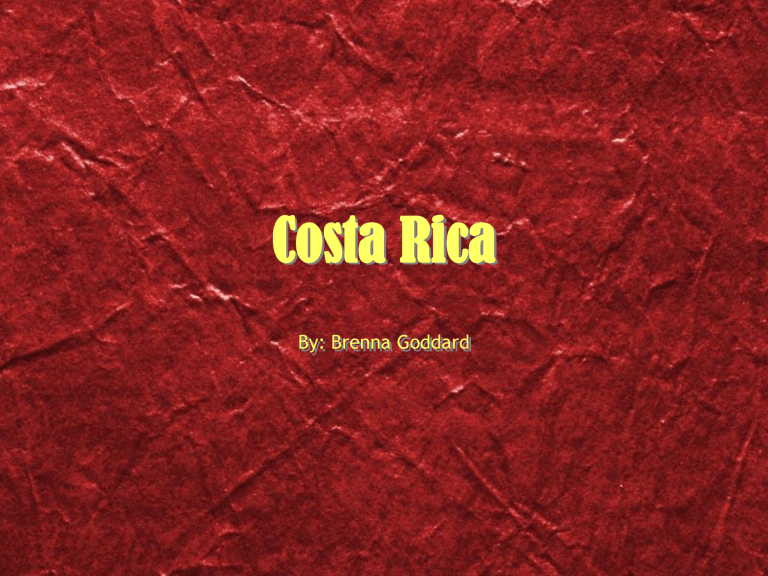
Costa Rica
By: Brenna Goddard
Climate and
People
• Tropical climate, averaging between 71 and 81 degrees
• The coolest months are November thru January, the warmest
March thru May
• Two major seasons: Rainy (May to Dec) and Dry (Jan to May)
• Population: 4,578,945, 1/3 of which live in San Jose, the capital
• Costa Ricans are also friendly referred to as “Ticos”
• The picture above is of Maria Paula, a daughter of my host family, isn’t she cute?!
• There are many religions in Costa Rica, but the most common one is Catholicism.
• Costa Rica is a beautiful country with three main regions: central highlands,
Atlantic costal plain, and the Pacific coast
• The highest elevation in the country is 12, 500ft
• Costa Rica has four volcanoes, two of which are still active!
Land
Volcano Arenal
• I was able to see Mt
Arenal while it was still steaming from an eruption it had a few days prior!
Don’t worry,
Volcanoes erupt all the time here so it is normal protocol for Ticos.
Other interesting facts..
• Language: The predominant language is Spanish, and the dialect differs in different regions of the country. The best way to learn the language is to stay with a host family, and try to make “Tico friends” so that you can practice while developing friendships. Also, while in Costa Rica, get to know your community! I liked to stop by a local café for coffee before class. The people will appreciate your business and sometimes will try to talk with you to try to learn English!
• Greetings: Cost Ricans have a very different idea of space.
They greet and say goodbye with a kiss on the cheek or hug, and walk closely together on the busy streets. This is something to adjust to, but it not a bad thing, in fact I began to love it!
• Ticos are also very vocal. It is considered a compliment when a man calls at a woman on the street. In America we see it as a negative thing, but here the women are used to it, and even enjoy it.
My Town:
Puntarenas
• Puntarenas is in a peninsula so it is surrounded by ocean on both sides. It is more long that it is wide and it takes only about ten minutes to walk the width of the city.
• I lived with a host family with two daughters ages 9 and 2. I had my own bedroom and shared a bathroom with my host sister.
• I went to the USAC school right off the beach to study Spanish. I also had the opportunity to take a cooking class and join in a dance class--highly recommended!
Home life: What to Expect..
• If you decide to live with a host family, they will probably prepare meals for you. You can always offer to help with anything around the house, but my family generally cooked and then let me know when it was time to eat. My host dad did teach me how to make a couple cool dishes too. We generally ate together if we were all home.
• My family also did my laundry but allowed me to help. I heard that it is rude to have your host family wash your underwear for you, but some families have no problem with it, so just ask how they normally do these things.
• My family gave me my own key so I could come and go as I pleased, but when I went out in the evening, I told them so that they could expect me back round a certain time. I also told them when friends and I were going on a weekend trip so they wouldn’t worry about me--this is very important! Just think of this family like your own family (be respectful and don’t make them worry about you).
A Typical Day..
• It took me about 15 minutes to walk to school, and I liked to get coffee at a local café on the way. My
Intermediate Spanish class lasted 2 hours and it was taught in Spanish, which helped us learn it quicker.
• Thankfully the classrooms had A/C!
• We had a 10 minute break in the middle of class and we all liked to play ping pong to pass the time.
• My professor was very pleasant and very helpful when needed. He was also very available for students to find for help.
• The grading system was pretty much the same as it is at KSU.
• We had homework everyday: vocabulary, grammar, and reading.
• Overall, the school was very similar to schools in the
U.S. The main classes are Monday-Friday.
Lifestyle
• Costa Ricans also have a unique sense of time. If a meeting is scheduled for 5pm, many people will arrive around 5:30 or so. This is also referred to as “Tico time.” However, when I took classes here, we were expected to be on time- no Tico time!
• In the same way, Ticos are typically laid back and easy going. They value relaxation time, and do not tend to keep rigorous schedules outside of work.
Housing/Transportation
• Most families in Costa Rica only have one car, two at most.
However, a lot of Ticos walk when a destination is fairly close, or take the bus, which goes from town to town.
• The houses are typically smaller than homes in the U.S. and are surrounded by bars, that open like a garage door. Most homes do not have A/C but have an open-air system. My family also had a washer, but hung clothes to air-dry, and hand-washed dishes.
Food/Dining
• A typical Costa Rican dish will include black beans and rice. They also usually include chicken, fish or beef, and some kind of vegetable. Avocados are quite popular, as well as fried plantains which are similar to bananas but larger and possessing a unique flavor.
• When going out to eat, expect for it to take some time. Costa Ricans like to enjoy their meals, and maybe spend two hours eating and enjoying company.
This is a dish that a host mom prepared for a friend and I, it was delicious!!
Family Recreation
• My host family enjoyed site seeing and traveling to other parts of the country when possible. Family time is essential to Costa
Ricans, even if it just involves spending time together in the home.
• My host dad frequently played soccer in the drive way with his daughter, and I even got to join in the fun.
• Ticos love playing sports, but particularly love soccer or
“futbol.” The World Cup is a huge deal to this country.
This is Maria Pia, we played a lot of board games, tea parties, soccer, and she especially loved makeovers. She considered me a good friend, and was offended if I was referred to as anything but that!
The Market
• While I spent time in Costa Rica, I frequented the Market, where they sold fruits, clothes, books, and the works. This was one of my favorite activities.
This is a friend of mine, among crates containing various delicious fruits and vegetables.
This is the bakery that I loved to frequent due to its tasty donuts and treats that reminded me of home!
Places to Avoid:
• Like I mentioned, the market is an awesome place to explore, but be careful about going in the evening. I never went to the market by myself when
I knew it would be getting dark soon.
• Also, find out the places to avoid by asking around.
• In general, trust your instinct. If you start to feel weird about a certain place or group of people, avoid it/them.
Things to do:
• Travel! Explore the country as much as possible and you will find gorgeous white beaches, the lush rainforest, beautiful waterfalls and more!
Things to do..
• Take a crocodile tour or go zip-lining in the rainforest..
Things to do..
• Take a coffee tour..
Go on a horseback ride!
• Meet your neighbors, take nature tours and learn about exotic animals and flowers, cook with your family and learn new culinary skills, and discover the culture: their arts and music!
The Cost of Adventure
Honestly, it is hard to say how much things will cost because it all depends on what you want to do.
First, determine what kind of person you are: Do you like to go all out and do every available activity there is? Or do you like to save money and limit your activities?
I would take about $100-$150 in spending money per weekend you are there. You may not spend that much, but it’s nice to not have to worry about money while you are there.
Hostels (not hotels) cost about $20-25 a night. Buses are cheaper than taxis.
If you do not think you will travel every weekend, and don’t want to buy a lot while you are there then you probably won’t need as much.
Also, when you exchange money, only take out what you will need for the next few days or the next week, try not to carry a lot of cash.
Helpful Tips:
• Before traveling to any country other than your own, check the currency and get a feel for the difference, it will help you tremendously!
• Try to look up useful phrases and expressions before you go, making it easier to get around and communicate basic needs.
• If you decide to go out at night, which can be risky, go in a group and always travel with at least one male.
• Never carry excessive amounts of money on you, and try to keep your credit cards and important documents (passport!) at your host family’s home.
• Consider buying a money holder that can be concealed under your clothing, it just keeps you from worrying about it as much.
• Don’t be flashy. Try to fit into the culture by wearing comfortable clothing, maybe packing a couple dressier things for special occasions, and I wouldn’t bother with bringing any bling.
• Research the local water safety to make sure it is safe to drink, I did not have problems with it, but everyone needs to check into this!
• Try to talk to the locals as much as possible as it will help you learn the language so much faster!
• Travel with your friends as much as possible, it is amazing what you can see in one weekend!!
• I used Skype to communicate with people back home and it was a big help with my home sickness!
• TAKE PICTURES!! These will last you a lifetime and help you keep all of your memories!
What to Pack:
• Follow the packing list that Study Abroad gives you, and also don’t forget: a raincoat, a poncho, an umbrella, your swimsuit, and clothes for both cool and hot weather. I would bring a pair or two of jeans, but mostly shorts for Costa Rica’s climate. Also bring a sweater for when you travel somewhere at a higher elevation (the mountains). Don’t forget bug spray and sunscreen, and flashlights come very in handy as well. And don’t forget your tennis shoes!
Resources
• http://www.worldheadquarters.com/cr/climate/
• http://www.nationsencyclopedia.com/Americas/Costa-Rica-
TOPOGRAPHY.html
• All pictures were taken by me and those are only a few of the them. Costa Rica is a truly beautiful country!


